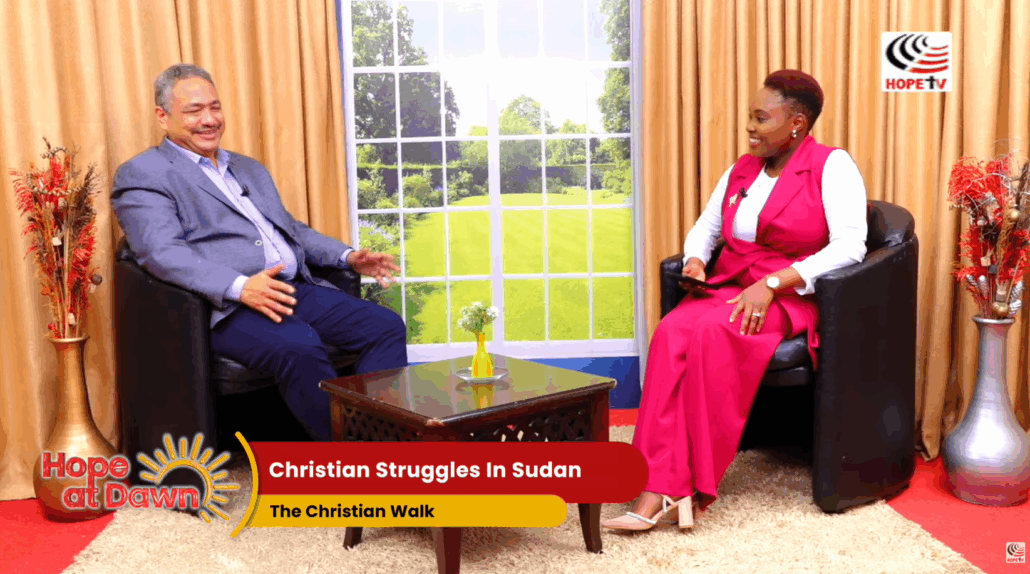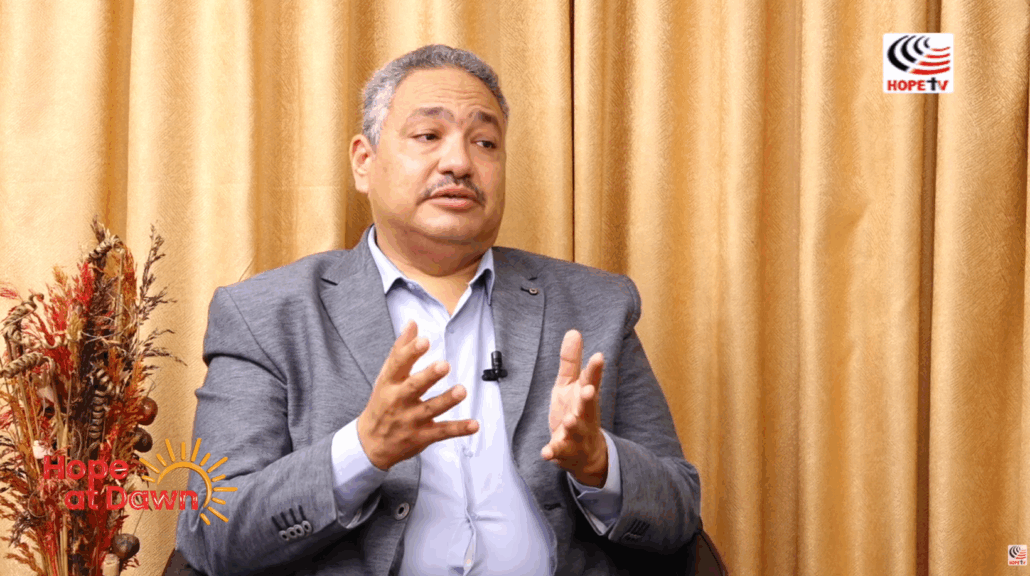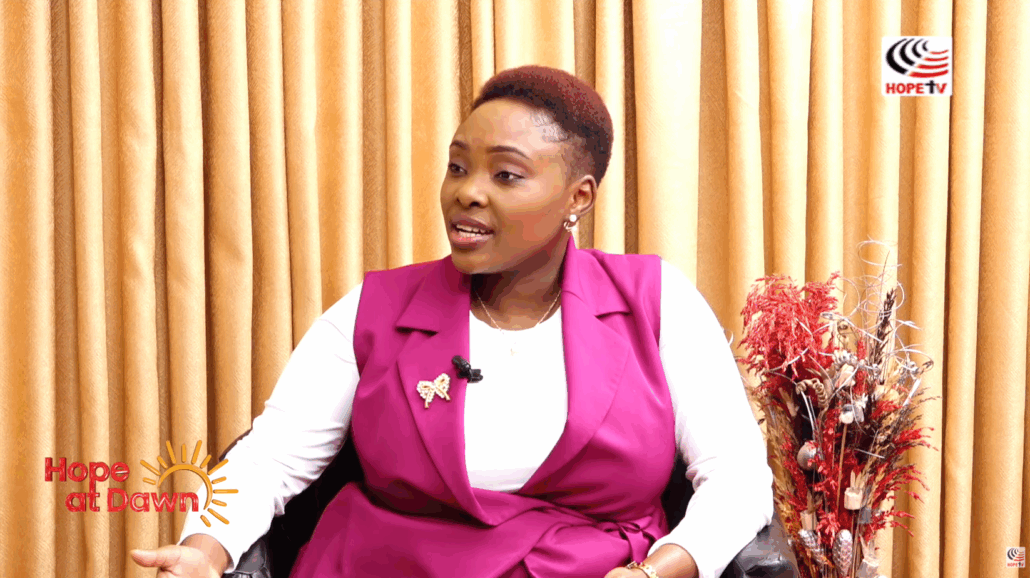Faith Under Fire: The Plight and Resilience of Sudanese Christians in War
Rafat Samir, the General Secretary of the Sudan Evangelical Alliance and Chairman of the Sudan Evangelical Community Council, was recently hosted by Hope TV Kenya for a powerful interview on the state of Christianity in Sudan. He shared heartfelt insights on the suffering and resilience of Christians in Sudan amid the ongoing war. The episode featured a heartfelt and eye-opening conversation about the deep suffering, faith, resilience, and ongoing challenges of Christians in Sudan, especially in the midst of the current war.
Sudan’s Context & Diversity
Samir described Sudan as a country once recognized as the largest in Africa and marked by significant cultural and ethnic diversity, with numerous languages, traditions, and skin tones represented across its population. However, he noted that decades of strict Islamic rule suppressed this diversity and placed heavy restrictions on religious freedom, particularly for Christians.
These policies fuelled long periods of unrest, including a 25-year civil war with the southern region that later became South Sudan in 2011, over two decades of conflict in Darfur, and repeated internal displacement. Although the 2019 revolution raised hopes for democratic reform, the 2021 military coup halted the transition. By 2023, full-scale war had erupted between the Sudanese Armed Forces and the Rapid Support Forces (RSF), deepening the country’s turmoil.

The Current Crisis in Sudan
In the interview, Samir outlined a dire humanitarian emergency. More than 13 million Sudanese have been displaced, with 6 million now living as refugees across borders. Millions more remain inside the country without access to adequate food, medical care, or stable shelter.
Children face acute vulnerability, with many out of school, orphaned, or at risk of forced recruitment into armed groups. Families continue to flee violence—sometimes numerous times—often ending up in unsafe, makeshift camps built from sticks, tarps, or discarded clothing.
Rafat added that,
“The church has opened all the schools, even the churches themselves, to become camps for the displaced people. We open our hearts and share even the little resources. We try to make food for these displaced people. We try to protect the children from the trauma of the war and to preserve the hope in the new future, not affected by the hatred and darkness of the war.”
Samir emphasized that some families survive on minimal resources such as salted water, wheat, or animal fodder. Despite the severity of the crisis, he said international attention remains limited, with many outside the region unaware of the conflict or dismissing it as a clash between rival factions. The lack of proper media coverage has left many Sudanese feeling abandoned.
The Struggles of Christians in Sudan
According to Samir, Sudan’s Christian minority continues to face longstanding discrimination and pressure, particularly under previous Islamist governments that discouraged Christian identity. Many believers, he said, were forced to change their names, conceal their faith, or endure the loss of church buildings due to state demolitions and confiscations.
The current conflict has intensified these challenges. Both armed factions are reported to show hostility toward Christian communities, leaving families with limited options for safe relocation. In many areas, Christians encounter rejection or harassment from surrounding communities.
Pastors and church leaders face significant difficulty ministering to their congregations, as public Christian gatherings and Bible studies are banned or risky. Many believers now worship covertly. Despite these conditions, Samir reported that the Christian community’s faith remains firm.
The Response of the Church in Sudan
Samir highlighted several examples of local churches stepping in to support those affected by the conflict. Many churches have opened their facilities to shelter displaced families, offering food, water, and clothing to people of all backgrounds.
Christian groups are running small-scale programs aimed at helping children cope with trauma and promoting peace and reconciliation within their communities. Samir said these acts of compassion have had a noticeable impact, prompting questions from non-Christians about why churches continue to help everyone, even during hardship. Some individuals, he added, have embraced Christianity after witnessing this generosity.


How Christians Survive Spiritually in Suffering
Samir said that amid danger and scarcity, Sudanese Christians continue to find strength in their faith. Despite lacking basic necessities, many gather to sing, pray, and support one another. He compared their endurance to the suffering of Christ, expressing the belief that God can transform pain into hope.
Their central prayer, he said, is simply: “Lord, help us lift our eyes to You.”
How Kenya and the Global Church Can Help
Samir expressed gratitude to Kenya for hosting Sudanese refugees and offering support through its strong Christian community. However, he said more assistance is needed. He called on churches and partners in Kenya and worldwide to pray for peace, help raise global awareness of the crisis, and advocate for political solutions.
He also encouraged material and spiritual support for displaced families, including food, water, temporary shelters, and trauma counselling. Even modest assistance, he noted, can significantly ease the daily struggles of those affected by the war.
Signs of Hope and Success Stories
Despite the ongoing conflict, Samir reported instances of hope and transformation. Some communities have been deeply moved by the compassion displayed by Christians. Refugees have encountered kindness from churches in Kenya and other nations.
Children continue to worship joyfully amid adversity, and families are discovering renewed faith. Samir believes that God is working even through the darkest circumstances to soften hearts and inspire change. He remains confident that Sudan can recover.
Final Message
Samir closed the interview with a plea not to forget Sudan. He thanked Kenya and others who have shown support and emphasized the biblical principle that “when one part of the body suffers, all suffer.” He expressed hope that God will rebuild Sudan according to His purposes, believing the Sudanese people have been preserved for a significant reason.
This timely episode brings attention to Sudan’s severe humanitarian and spiritual crisis—marked by war, displacement, hunger, and persecution—while also highlighting the steadfast faith of Sudanese Christians. Rafat Samir shares accounts of believers who continue to serve their communities with compassion despite danger and loss. He urges the global church to pray, provide support, and advocate for peace, expressing faith that God can bring restoration even amid deep suffering. Let us therefore continue to pray, give and advocate for Christianity in Sudan.



